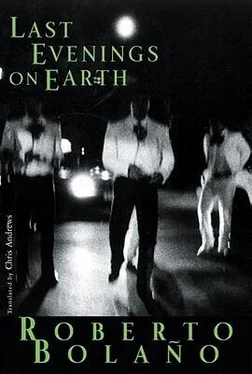A poet can endure anything. Which amounts to saying that a human being can endure anything. But that's not true: there are obviously limits to what a human being can endure. Really endure. A poet, on the other hand, can endure anything. We grew up with this conviction. The opening assertion is true, but that way lie ruin, madness, and death.
I met Enrique Martin a few months after arriving in Barcelona. He was born in 1953 like me and he was a poet. He wrote in Castilian and Catalan with results that were fundamentally similar, though formally different. His Castilian poetry was well meaning, affected, and quite often clumsy, without the slightest glimmer of originality. His model (in Castilian) was Miguel Hernбndez, a good poet whom, for some reason, bad poets seem to adore (my explanation, though it's probably simplistic, is that Hernбndez writes about pain, impelled by pain, and bad poets generally suffer like laboratory animals, especially during their protracted youth). Enrique's Catalan poetry, by contrast, was about real things and daily life, and only his friends ever read or heard it (although, to be perfectly frank, the same is probably true of what he wrote in Castilian; the only difference, in terms of audience, was that he published the Castilian poems in magazines with tiny circulations, seen only, I suspect, by his friends, if at all, while he read the Catalan poems to us in bars or when he came around to visit). Enrique's Catalan, however, was bad (how he managed to write better poems in a language he hadn't mastered than in his mother tongue must, I suppose, be numbered among the mysteries of youth). In any case Enrique had a very shaky grasp of the rudiments of Catalan grammar and it has to be said that he wrote badly, whether in Castilian or in Catalan, but I still remember some of his poems with a certain emotion, colored no doubt by nostalgia for my own youth. Enrique wanted to be a poet, and he threw himself into this endeavor with all his energy and willpower. He was tenacious in a blind, uncritical way, like the bad guys in westerns, falling like flies but persevering, determined to take the hero's bullets, and in the end there was something likable about this tenacity; it gave him an aura, a kind of literary sanctity that only young poets and old whores can appreciate.
At the time I was twenty-five and thought I had done it all. Enrique was the opposite: there were so many things he wanted to do, and, in his own way, he was preparing to take on the world. His first step was to bring out a literary magazine, or fanzine, really, which he financed with his savings (he had been working in some obscure office near the port since he was fifteen). At the last minute, Enrique's friends (and one of mine among them) decided not to include my poems in the first issue, an incident that, I am ashamed to admit, led to an interruption of our friendship. According to Enrique, it was the fault of another Chilean, an old friend of his, who had opined that two Chileans was one Chilean too many for the first issue of a little magazine devoted to Spanish writing. I was in Portugal at the time, and when I got back, I decided that was it: I would have nothing more to do with the magazine and it would have nothing more to do with me. I refused to listen to Enrique's explanations, partly because I couldn't be bothered, partly to assuage my wounded pride, and I washed my hands of the whole business.
We didn't see each other for a while. But in the bars of the Gothic Quarter I would sometimes run into mutual acquaintances, and they kept me laconically informed of Enrique's latest adventures. That's how I found out that the magazine (prophetically named White Rope, although I'm sure it wasn't his idea) had folded after the first issue, and that the first performance of a play he had tried to put on at a cultural center in the Nou Barris district had been greeted with boos and jeers, and that he was planning to launch another magazine.
One night he turned up at my apartment. He was carrying a folder full of poems and he wanted me to read them. We went out to dinner at a restaurant in the Calle Costa and over coffee he read me a few of the poems. He awaited my judgment with a mixture of a self-satisfaction and fear. I realized that if I said they were bad, I would never see him again, as well as getting myself into an argument that could easily continue into the small hours. I said I thought they were well written. I wasn't overly enthusiastic, but carefully avoided the slightest criticism. I even said I thought one of them was very good, in the manner of Leуn Felipe, a nostalgic poem about the landscapes of Extremadura, where Enrique had never lived. I don't know if he believed me. He knew I was reading Sanguinetti at the time and subscribed (though not exclusively) to the Italians views on modern poetry, so I could hardly be expected to admire his verses about Extremadura. But he pretended to believe me; he pretended to be glad he had read me the poems and then, revealingly, he started talking about the magazine that had perished after the first issue, and that's when I realized that he didn't believe me but wasn't going to say so.
That was it. We talked a while longer, about Sanguinetti and Frank O'Hara (I still like Frank O'Hara but I haven't read Sanguinetti for ages), about the new magazine he was planning to launch (he didn't invite me to contribute), and then we said good-bye in the street, near my house. It must have been a year or two before I saw him again.
At the time I was living with a Mexican woman and it looked as if the relationship would be the death of her, and me, and the neighbors, and sometimes even the people who ventured to pay us a visit. Once was enough for our unfortunate visitors, and soon we were hardly seeing anyone. We were poor (although the woman came from a well-to-do family in Mexico City, she absolutely refused all their offers of financial assistance); our battles were Homeric and a dark cloud seemed to be looming over us day and night.
That's how things were when Enrique Martin reappeared. As he crossed the threshold with a bottle of wine and some French pбtй, I had the impression he had come as a spectator, to watch the final act of a major crisis in my life (although, in fact, I felt fine, it was my girlfriend who was feeling rotten), but later, when he invited us to dinner at his place, and was so keen to introduce us to his girlfriend, I realized that he hadn't come to observe but, probably, to be observed, or possibly even because, in a sense, my opinion still mattered to him. I know I didn't appreciate this at the rime. For a start, I was annoyed by his sudden appearance, and tried to make my greeting sound ironic or cynical, though it probably just sounded apathetic. To be honest, in those days, I wasn't fit company for anyone. This was common knowledge: people avoided me or fled my presence.
But Enrique wanted to see me, and for some mysterious reason, the Mexican woman liked Enrique and his girlfriend, so we ended up having a series of meals together, five in all.
Naturally, by the time we resumed our friendship— though the term is no doubt excessive — we disagreed about almost everything. My first surprise came when I saw his apartment (when our ways had parted he was still living with his parents and although I later heard that he was sharing a place with three friends, for one reason or another I never went there). Now he had a loft in the Barrio de Gracia, full of books, records, and paintings, a large though perhaps rather dim dwelling that his girlfriend had decorated with eclectic taste, and they had some interesting things: objects picked up on recent trips to Bulgaria, Turkey, Israel, and Egypt, some of which were more than tourist souvenirs or imitations. My second surprise came when he told me that he had stopped writing poetry. He said this after dinner, in the presence of my girlfriend and his, although the confession was in fact directed specifically at me (I was playing with an enormous Arab dagger, with ornamental work on both sides of the blade; it can't have been very practical to use), and when I looked up he was smiling as if to say, I've grown up, I've realized you can enjoy art without making a fool of yourself, without keeping up some pathetic pretense of being a writer.
Читать дальше












